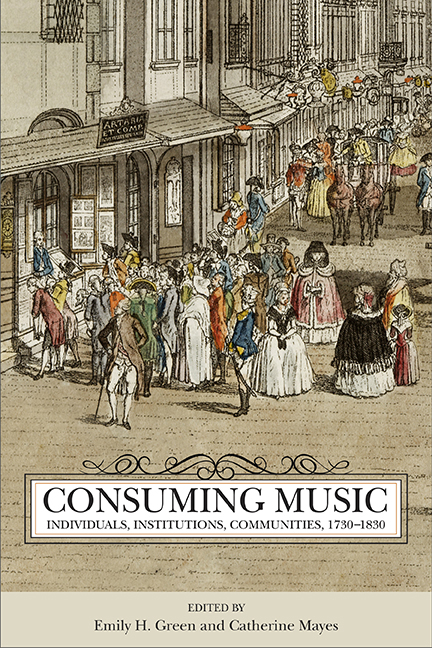Book contents
- Frontmatter
- Contents
- Acknowledgments
- Introduction
- Part One Selling Variety
- Part Two Edifying Readers
- Part Three Marketing the Mundane
- Part Four Cultivating Communities
- 8 Exchanging Ideas in a Changing World: Adolph Bernhard Marx and the Berliner allgemeine musikalische Zeitung in 1824
- 9 Parisian Opera between Commons and Commodity, ca. 1830
- List of Contributors
- Index
8 - Exchanging Ideas in a Changing World: Adolph Bernhard Marx and the Berliner allgemeine musikalische Zeitung in 1824
from Part Four - Cultivating Communities
Published online by Cambridge University Press: 26 April 2018
- Frontmatter
- Contents
- Acknowledgments
- Introduction
- Part One Selling Variety
- Part Two Edifying Readers
- Part Three Marketing the Mundane
- Part Four Cultivating Communities
- 8 Exchanging Ideas in a Changing World: Adolph Bernhard Marx and the Berliner allgemeine musikalische Zeitung in 1824
- 9 Parisian Opera between Commons and Commodity, ca. 1830
- List of Contributors
- Index
Summary
If I may begin with an understatement, music journals of the eighteenth and nineteenth centuries offer a wealth of material for scholarly study. Essays and reviews of musical works in periodicals such as the Allgemeine musikalische Zeitung and the Neue Zeitschrift für Musik are rich sources for exploring a variety of topics: music criticism, as in the work of Mary Sue Morrow, Sanna Pederson, and Barbara Titus; and reception histories of individual composers, as in Robin Wallace's work on Beethoven or the volumes of contemporaneous criticism of Beethoven edited in English by Wayne M. Senner and in German by Stefan Kunze. The content of these journals can also tell us a good deal about the societies and institutions that published, performed, and enjoyed the music they discuss.
The periodicals in which these texts appear, however, are not documents that existed in a vacuum. They were, rather, part of a dynamic and competitive commercial market, an aspect of these publications that this volume sets into relief. Not only were they destined for a paying readership, but most journals were produced by publishing houses whose primary business was selling music. I suggest that considering this wider commercial context as more than a mere backdrop in fact materially changes the way we read these texts.
As a brief example, we might look to the Allgemeine musikalische Zeitung, in which E. T. A. Hoffmann's famous groundbreaking essays on Beethoven appeared in 1810. Although Hoffmann's insightful writing naturally absorbs our attention, the commercial context of the reviews is by no means neutral; compelling as they are, the essays served a range of other interests. Most significant, the journal itself was issued by Breitkopf und Härtel, which also published and sold the scores Hoffmann was discussing. In a basic way, Hoffmann's essays served as advertising, generating or increasing demand for publications Breitkopf und Härtel could then supply. For modern readers, this function should at the very least raise questions about the selection of works reviewed in the journal and, perhaps more important, about works whose omission for commercial reasons has left them with a less prominent contemporaneous documentary history.
- Type
- Chapter
- Information
- Consuming MusicIndividuals, Institutions, Communities, 1730–1830, pp. 205 - 221Publisher: Boydell & BrewerPrint publication year: 2017

